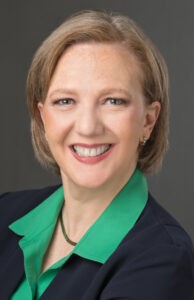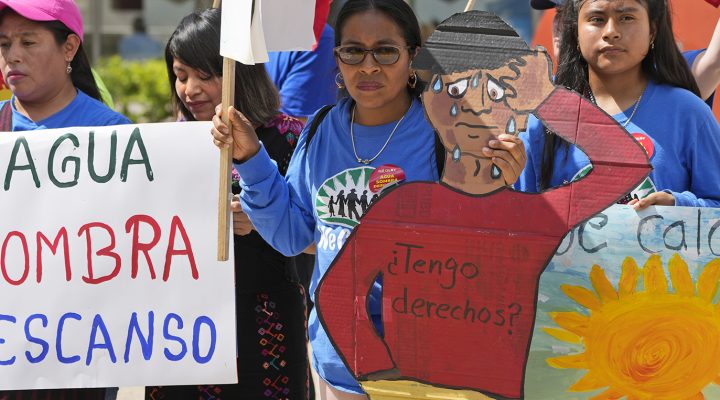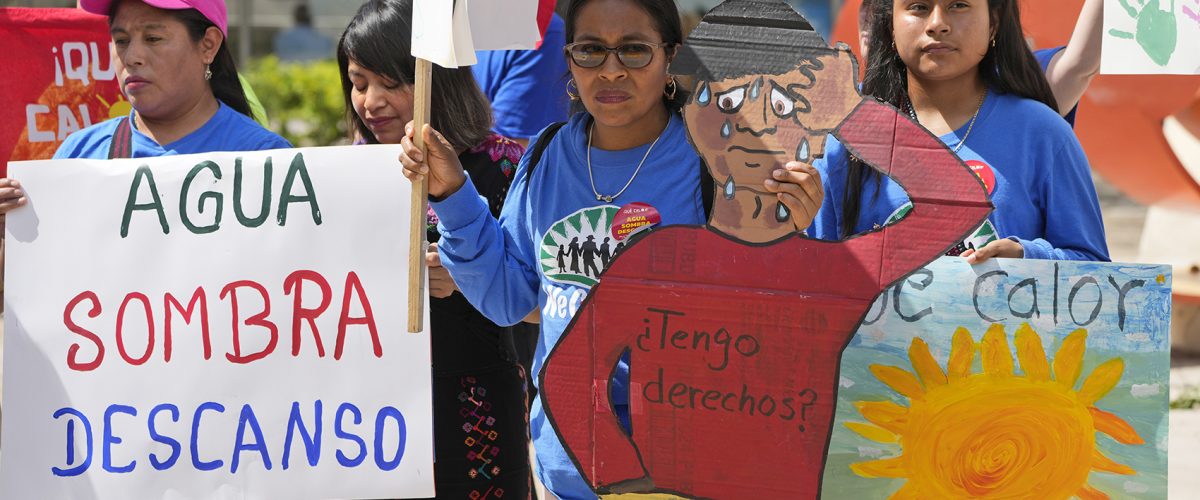This morning, I took my dogs for a walk because it was the coolest time of the day when their paws wouldn’t be scorched on pavement in our multiple days of temperatures that feel like it’s 100+ degrees. Living in Houston for 20 years, I am used to triple-digit weather — in August. But the number of triple-digit heat-index days in June and July are happening sooner and more frequently.
As we walked, I thought about the people and animals who must live and work outside in this brutal heat. Recently, workers at a Houston McDonald’s walked out on strike because there was no air conditioning and they were being forced to work inside where it was already 90 degrees at 7:30 a.m. Last month, a Dallas postal worker died during his route on a day when the heat index was 115 degrees. In fact, in 2022, at least 279 people died in Texas from issues related to the extreme heat.

Ginny Brown Daniel
What have we done to ourselves and our neighbors?
Sadly, this is the reality scientists have been warning us about for years in order to plead that we change our consumption behaviors of our natural resources. And now, I am afraid our climate-change hourglass is quickly slipping by to make any substantive changes in order to combat these extreme weather conditions.
So here we are — our new normal of extreme heat. If we are not going to rectify our errors in order to reduce the speed at which our climate changes irrevocably, how do we prepare for our new normal? What paradigms and policies need to be changed quickly in order to accommodate this extreme heat for every part of our lives?
As a faith leader, I wonder what we need to do to protect our most vulnerable neighbors who don’t have working air conditioners, who work outside, who are temporarily unsheltered. As a community leader, I wonder what agencies from safety, government, health care, business, faith and education need to come together in order to develop a comprehensive extreme-heat plan of action for our entire community or state.
Unfortunately, in a time of polarized political bickering, this idea of bipartisan, collaborative community extreme-heat planning is almost nonexistent. In fact, our state leaders seem to actually be making matters worse.
In this year’s regular session, the Texas Legislature passed House Bill 2127, which eliminates local policies requiring 10-minute water breaks for workers every four hours.
Recently, Houston labor advocates protested this new law that will go into effect Sept. 1, calling it the “law that kills.” As Luz Martinez said at the protest: “We are human beings who need respect. We really need to be allowed to work without problems, without any barriers. … Believe me, we are dying inside those buildings when they take away our water and our (break) time.”
“I can’t believe we are having this discussion in the midst of heat that no person should endure without relief.”
I can’t believe we are having this discussion in the midst of heat that no person should endure without relief. From a purely economic perspective, you would think businesses would want to ensure their workers’ safety to optimize worker productivity. From a community perspective for our children’s education, you would think schools would want to ensure children are able to come to school and not stay at home due to health issues related to heat stress.
“For I was hungry and you gave me food, I was thirsty and you gave me something to drink.”
This passage from Matthew 25:43 should be the thorn in our flesh. It should be our moral and ethical guide for what we should do in the midst of extreme heat.
And yet, what’s even more frustrating is that the elected officials who sponsored and voted for this bill as well as the governor who signed it all proudly call themselves Christians. That’s a complete headscratcher to me because Jesus clearly states how we are to live our lives if we are serious about following him. For all the Christians I’ve ever known, Matthew 25:43 is our mandate for how to live our lives.
But this is where the stealth movement of white Christian nationalism comes into play — those who are creating these draconian laws are more concerned about protecting their power and privilege than doing what’s good for all people even and especially in a time of crisis. Phillip Gorski defines a motivational factor of white Christian nationalism as “loyalty to your tribe and not your country.” The tribe here is white, fundamentalist Christians, who believe those not of this tribe — Black and brown individuals — are dangerous and must never be in power.
“White Christian nationalism, extreme heat and state legislation removing water breaks may all seem unrelated until you look deeper.”
Now, I know you may be scratching your head wondering how I can go from talking about extreme heat conditions to a tribal battle between us vs. them. Because that’s how stealth this dis-ease to our democracy has become. White Christian nationalism, extreme heat and state legislation removing water breaks may all seem unrelated until you look deeper to see how they are indeed interconnected together.
In Texas, this white Christian fundamentalism tribe mentality is what causes state leaders to eliminate power from local governments that are led by Black and brown leaders (Austin, San Antonio, Dallas, Houston).
And House Bill 2127 was specifically written to provide regulatory “stability,” which is code for “order,” a high priority for white Christian nationalism. Order ensures the white fundamentalist Christian tribe’s power will remain intact, thus eliminating local and county governances that provide relief for the welfare of its most vulnerable residents in the extreme Texas heat.
In a recent study, the Department of Energy reports that in these urban areas, Black and brown people are more prone to face higher levels of outdoor heat stress than whites.
So what do we do?
How do we battle extreme heat and white Christian nationalism simultaneously?
We work together to be the change we must see in our new normal of extreme heat. I see this in Austin, where they have a resiliency officer, Laura Patiño, who says: “In addition to physical adaptations, we have found that increasing social connectivity helps increase community resilience to extreme heat. Some hubs offer bathrooms, mobile phone charging and shaded community spaces, while others can provide emergency food and water, as well as temporary shelter. The locations for the hubs were selected using a social vulnerability index to ensure they are in areas where residents most need assistance. Officials are working with community partners to build trust and relationships with locals to encourage use of the hubs. By 2025, Austin plans to grow the network to 30 hubs across the city.”
San Antonio is the first Texas city to apply a coat of paint that reflects the sun’s rays to specific streets, which decreases surface temperatures by 10 to 15 degrees. They also have established a climate action fund, which sets aside a minimum of $8 million a year for the next five years.
New York established a Be a Buddy program to support those who are most vulnerable during extreme weather conditions.
None of these examples are the ultimate solutions, but each of them represents a start.
In our new normals of extreme heat and white Christian nationalism, our work is hard and our journey is arduous. But we must do something. So drink plenty of water, go for walks in cool moments early in the morning, talk to your neighbors, and do something to fight white Christian nationalism and extreme heat in your community.
Ginny Brown Daniel is an ordained minister who is a keynote speaker and writes on faith and politics in Texas. Visit her website at www.ginnybd.com.
Related articles:
With a change in perspective, a new, more modest standard of living is possible | Opinion by Curtis Ramsey-Lucas
The fantastical world of climate change denial: Slouching toward annihilation | Opinion by Rodney Kennedy


